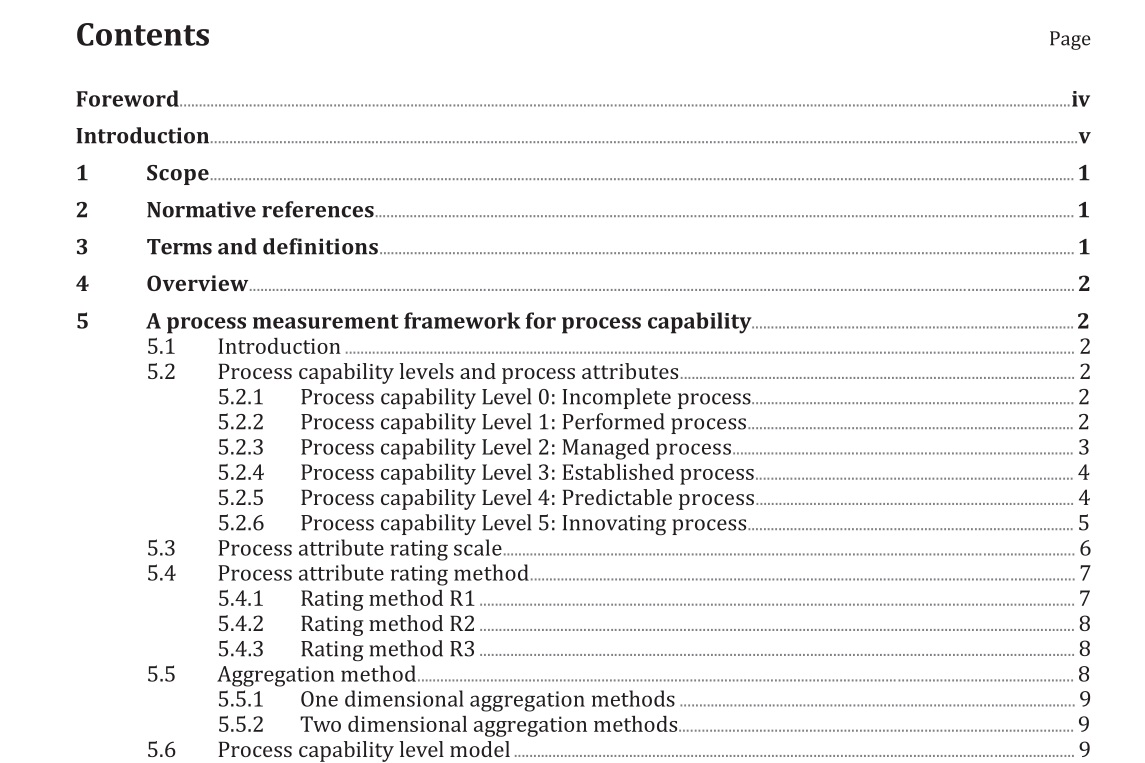BS ISO IEC 33020 pdf download.Information technology — Process assessment — Process measurement framework for assessment of process capability
1 Scope
This International Standard defines a process measurement framework that supports the assessment of process capability, in accordance with the requirements of ISO/IEC 33003. The process measurement framework provides a schema that can be used to construct a process assessment model conformant with ISO/IEC 33004 [4] which can be used in the performance of assessment of process capability according to the requirements of ISO/IEC 33002 [3] . In the context of this and related standards, process capability is a process quality characteristic related to the ability of a process to consistently meet current or projected business goals. The process measurement frameworks defined in this International Standard form a structure which a) facilitates self-assessment, b) provides a basis for use in process improvement and process quality determination, c) is applicable across all application domains and sizes of organization, d) produces a set of process (capability) attribute ratings (process profile), and e) derives a process capability level. NOTE Copyright release: Users of this International Standard may reproduce subclauses 5.2, 5.3, 5.4 and 5.6 as part of any process assessment model or maturity model so that it can be used for its intended purpose.
4 Overview
The capability to perform a process to a specific level of performance depends on well established principles. This International Standard sets out those principles that are common to all domains. The process capability measurement framework described in this International Standard is expressed in terms of a set of process attributes. Each process attribute is defined in terms of a set of process attribute outcomes which can be evaluated to indicate the extent of achievement of the process attribute. The process attributes are organised into process capability levels, ranging from Incomplete (in which the process does not achieve its defined process outcomes) to Innovating (in which the process is continually improved to respond to organizational change). The result of an assessment, using a process assessment model that incorporates this process measurement framework, will be a set of process profiles – ratings of the achievement of the set of process attributes for each process in the scope of the assessment. The result can also be expressed in terms of the capability level ratings achieved for each process in the assessment scope. A capability level rating does not guarantee that an organization will perform its processes at any given process capability level, simply that it is capable of performing its processes at that level.
5 A process measurement framework for process capability
5.1 Introduction This clause defines a process measurement framework for the assessment of process capability, conformant with the requirements of ISO/IEC 33003. This process measurement framework provides a schema that can be used to construct a process assessment model for assessing process capability. Within this process measurement framework, the measure of capability is based upon a set of process attributes. Each process attribute defines a measurable property of process capability. The extent of process attribute achievement is characterised on a defined rating scale. The process capability level for an assessed process is derived from the set of process attribute ratings represented in the process profile. The achievement of one process attribute may be associated with the achievement of another process attribute within the process measurement framework. 5.2 Process capability levels and process attributes Process capability is defined on a six point ordinal scale that enables capability to be assessed from the bottom of the scale, Incomplete, through to the top end of the scale, Innovating. The scale represents increasing capability of the implemented process, from failing to achieve the process purpose through to continually improving and able to respond to organizational change.
BS ISO IEC 33020 pdf download
